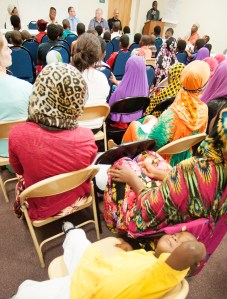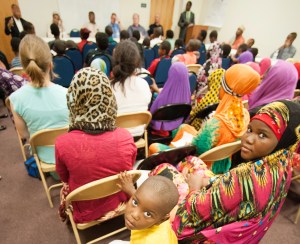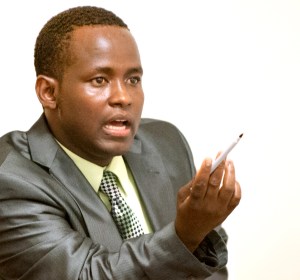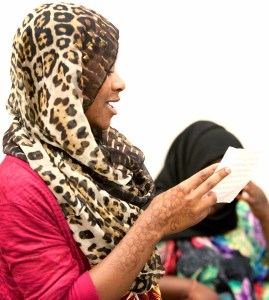LEWISTON — Mayor Robert Macdonald had some solid advice for a group of children gathered at the B Street Community Center on Wednesday, as well as words of a lesser concern for the soccer players in the room.
“When you play Portland,” the mayor told them, “no excuses. You beat them.”
The soccer crowd applauded while others chuckled. It was a light moment in a meeting weighted with the importance of the topic at hand: juvenile justice and how it pertains to immigrant children in Lewiston.
The program was presented by the Somali Bantu Youth Association of Maine. As its been in the previous two years, the event was heavily attended, with every chair filled. It was teens and younger children, mostly, but also their parents, teachers and social workers. At the front of the room were a panel that included a district court judge, a pair of juvenile corrections officers, a policeman, the police chief and Macdonald.
Macdonald had some practical words of wisdom for the youths.
“If you want to be a success in America, get a good education. You go in there and you really try,” he said. “Speak English, but don’t you lose that second language. If you can speak two languages, you can speak three or four.”
It was a question and answer session mostly, but a few of the teens did get a chance to address the room. One Somali boy, speaking quickly and nervously, told the crowd how he had been a good student and an athlete until he fell in with a group of troublemakers interested only in mischief. After that, his old friends avoided them. His grades started falling and he found himself skipping school.
The boy found his way to B Street, where he got involved. His grades started to improve and so did his attitude.
“My life began to change little by little,” he said. “I learned my lesson about what hanging out with the wrong crowd does to you.”
Isha Kasai, a 16-year-old, told of coming to America in 2004 and not knowing what to expect. At a soccer game, she met someone from the community center. She got involved and things fell into place.
“That’s what we are trying to do,” Rilwan Osman, director of the SBYAM, said. And it seems to be having an impact. For six years now, the group has been working to bridge the gap between Somalis and the rest of the community. Part of that is providing a place where they can get answers about the juvenile justice system and all that it entails.
That’s where the Q & A begins.
One teen wanted to know what kind of trouble it would take to be sent to a juvenile detention center.
“If it’s severe enough or if it’s repeated, we’ll send it to the court,” Juvenile Community Corrections Officer Jay Pennell said.
Steve Labonte, also a juvenile corrections officer working in Lewiston, explained how they try to use probation as a way to keep young people from getting locked up. By setting conditions, the offender gets a chance to remain free, but only by staying out of further trouble.
“If the youth is doing the things he’s supposed to do,” Labonte said, “he doesn’t have to go to the youth center.”
Judge Rick Lawrence of 8th District Court in Lewiston told them that no one should believe that being young means you’ll never get into serious trouble. Lawrence has had to send juveniles away in the past.
“We’re all human,” the judge told them. “We all make mistakes, including people your age.”
The concept seemed to have an effect. For a moment, the lively chatter among the meeting participants — more than 50 of them — quieted as they pondered this.




Comments are no longer available on this story